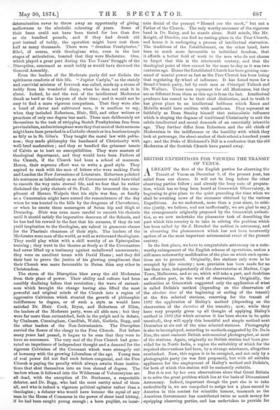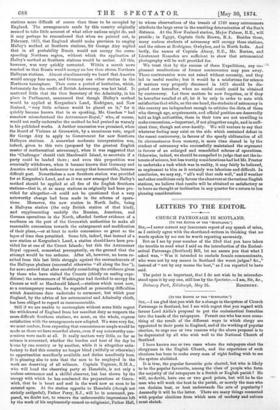BRITISH EXPEDITIONS FOR VIEWING THE TRANSIT OF VENUS.
A LREADY the first of the English parties for observing the IA. Transit of Venus on December 9, of the present year, has sailed from our shores. It will not be long before the other observing parties follow ; and already the busy note of prepara- tion, which has so long been heard at Greenwich Observatory, is beginning to give place to the quiet preceding the time when we shall be awaiting news of the successes obtained by the various Expeditions. As we undertook, more than a year since, to criti- cise (justly, we believe, and not ineffectually, we are glad to say,) the arrangements originally proposed by the Greenwich authori- ties, so we now undertake the pleasanter task of describing the part which this country is to take in solving the problem which has been called by Sir J. Herschel the noblest in astronomy, and in observing the phenomenon which has not been incorrectly spoken of as the most important astronomical event of the present century.
In the first place, we have to congratulate astronomy on a note- worthy enlargement of the English scheme of operations, and on a still more noteworthy modification of the plan on which such opera- tions are to proceed. Originally, five stations only were to be occupied by this country ; now, provision has been made for no less than nine, independently of the observatories at Madras, Cape Town, Melbourne, and so on, which will take a part, and doubtless an effective part, in the work of observation. Originally, the authorities at Greenwich suggested only the application of what is called Delisle's method (depending on the observation of the absolute time of the beginning or ending of the transit) at the five selected stations, reserving for the transit of 1882 the application of Halley's method (depending on the observation of the duration of the transit) ; now, while they have very properly given up all thought of applying Halley's method in 1882 (for which occasion it has been shown to be quite unsuited), they will apply this beautiful and simple method next December at six out of the nine selected stations. Photography is also to be employed, according to methods suggested by Dr. De la Rue, the most eminent British astronomical photographer, at most of the stations. Again, originally no British station had been pro- vided for in North India, a region the suitability of which for the required observations bad been, by a strange mischance, altogether overlooked. Now, this region is to be occupied, and not only by a photographic party (as was first proposed), but with all suitable appliances for the employment of Halley's method and Delisle'e, for both of which this station will be eminently suitable.
But it is not by her own observations alone that Great Britain is to solve the great problem which lies at the basis of Dimensional Astronomy. Indeed, important though the part she is to take undoubtedly is, we are compelled to assign her a place second to America in this contest for scientific honour, inasmuch as the American Government has contributed twice as much money for equipping observing parties, and has undertaken to provide for
stations more difficult of access than those to be occupied by England. The arrangements made by this country originally seemed to take little account of what other nations might do, and it may perhaps be remembered that when we pointed out, in February, 1873, that England should make provision to employ Halley's method at Southern stations, Sir George Airy replied that in all probability Russia would not occupy the corre- sponding Northern region, without which the application of Halley's method at Southern stations would be useless. All this, however, was very quickly corrected. Within a month news reached us that Russia would occupy no less than eleven Northern Halleyan stations. Almost simultaneously we heard that America would occupy four more, and Germany one other station in the Northern hemisphere. Then came a period of hesitation, which, fortunately for the credit of British Astronomy, was but brief. It mattered little that the then Secretary of the Admiralty, in his place in Parliament, announced that though Halley's method would be applied at Kerguelen's Land, Rodriguez, and New Zealand, " very little reliance would be placed on it," for it quickly became known that in so speaking, Mr. Goschen " had somehow misunderstood the Astronomer-Royal," who, of course, would not really undervalue the method he had praised so warmly in his published works. A further concession was promised, when the Board of Visitors at Greenwich, by a unanimous vote, urged Sir George Airy to apply to Government for new Southern Halleyan stations. A somewhat moderate interpretation was, indeed, given to this vote (proposed by the greatest English master of mathematical astronomy), when it was suggested that the 'Challenger' should visit Macdonald Island, to ascertain if a party could be landed there ; and even this proposition was eventually withdrawn, when it became known that Germany and America would both endeavour to occupy that honourable, because difficult post. Nevertheless a new Southern station was provided for at Kerguelen's Land, and as it was now arranged that Halley's method should be applied at all five of the English Southern stations—that is, at as many stations as originally had been pro- vided for altogether —it could not be questioned that a very noteworthy change had been made in the scheme of opera- tions. Moreover, the new station in North India, being a Halleyan station (the only British station of that kind), and supplementing usefully the Russian, American, and German operations in the North, afforded further evidence of a readiness on the part of the Greenwich authorities to make all reasonable concessions towards the enlargement and modification of their plans,—or at least to make concessions as great as the lapse of time then permitted. Some felt, indeed, that instead of a new station at Kerguelen's Land, a station should have been pro- vided for at one of the Crozet Islands ; but this the Astronomer Royal opposed, somewhat peremptorily, on the ground that the attempt would be too arduous. After all, however, no harm re- sulted from this last little struggle against the encroachments of the Halleyan phalanx (successful otherwise "all along the line "), for news arrived that after carefully considering the evidence given by those who have visited the Crozets (chiefly on sealing expe- ditions) the astronomers of Washington had decided to occupy the Crozets as well as Macdonald Island,—stations which must now, as a contemporary remarks, be regarded as presenting difficulties which Americans dare undertake to surmount, but which poor England, by the advice of her astronomical and Admiralty chiefs, has been obliged to regard as insurmountable.
Still if we are unable to contemplate without some little regret the withdrawal of England from her manifest duty as respects the more difficult Southern stations, we must, on the whole, express satisfaction with the arrangements now adopted. We were very far, we must confess, from expecting that concessions so ample would be made as those we have recorded above, even if any noteworthy con- cessions were made at all. It really matters very little, so far as science is concerned, whether the burden and heat of the day be b)rne by one country or by another, while it is altogether satis- factory to find this country no longer blind (wilfully or otherwise) to opportunities manifestly available and duties manifestly hers. It is pleasing also to note that the men to be employed in the work are deserving of all reliance. Captain Tupman, R.M.A., who will head the observing party at Honolulu, is not only a zealous astronomer and a skilful observer, but has shown by the energy with which he has conducted the preparations at Green- wich, that he is heart and soul in the work now so soon to be entered upon. At the station opposite to Honolulu (though not strictly antipodal), Father Perry, S.J., will be in command, pre- pared, we doubt not, to remove the unfavourable impressions left by the work of his unpleasantly-named co-religionist, Father Hell, to whose observations of the transit of 1769 many astronomers attribute the large error in the resulting determination of the Sun's distance. At the New Zealand station, Major Palmer, R.E. will preside ; in Egypt, Captain Orde Brown, B.A. Besides these, many zealous students of astronomy will occupy these stations, and the others at Rodriguez, 0 whyhee, and in North India. And lastly, the names of Captain Abney, R.E., Mr. Burton, and Lieutenant Ramsden are sufficient to show that astronomical photography will be well provided for.
We trust that by the success of these Expeditions, any un- pleasant recollections of former controversies may pass away. Those controversies were not raised without necessity, and they led to useful results ; but it would be a misfortune for science if matters very properly discussed in 1873 should be dis- puted over hereafter, when no useful result could be obtained by controversy. Let these matters be now forgotten, or if they be hereafter recalled at all, let it be only in order to note with satisfaction that while, on the one hand, the students of astronomy in this country are independent enough to criticise the dicta of those who through age, acquirements, and official position are deservedly held as high authorities, these in their turn are not unwilling to make concessions,—important, if not altogether ample, and in suffi- cient time, though not over-hastily. We will venture to say that whatever feeling may exist on the side which sustained defeat in the recent controversy, in favour of the speedy obliteration of all its circumstances from memory, is more than shared in by the student of astronomy who successfully maintained the argument in favour of an enlarged and remodelled scheme of operations. Otherwise, indeed, we should be compelled to judge that not the in- terests of science, but less worthy considerations had led Mr. Proctor to undertake a task which was in reality, it may fairly be believed, as unpleasant to him as it certainly was laborious and difficult. In conclusion, we may say, " all's well that ends well," and if weather and other conditions only favour the observers at the various English stations, we believe that results will be obtained so satisfactory as to leave no thought or inclination in any quarter for a return to less pleasing considerations.



































 Previous page
Previous page